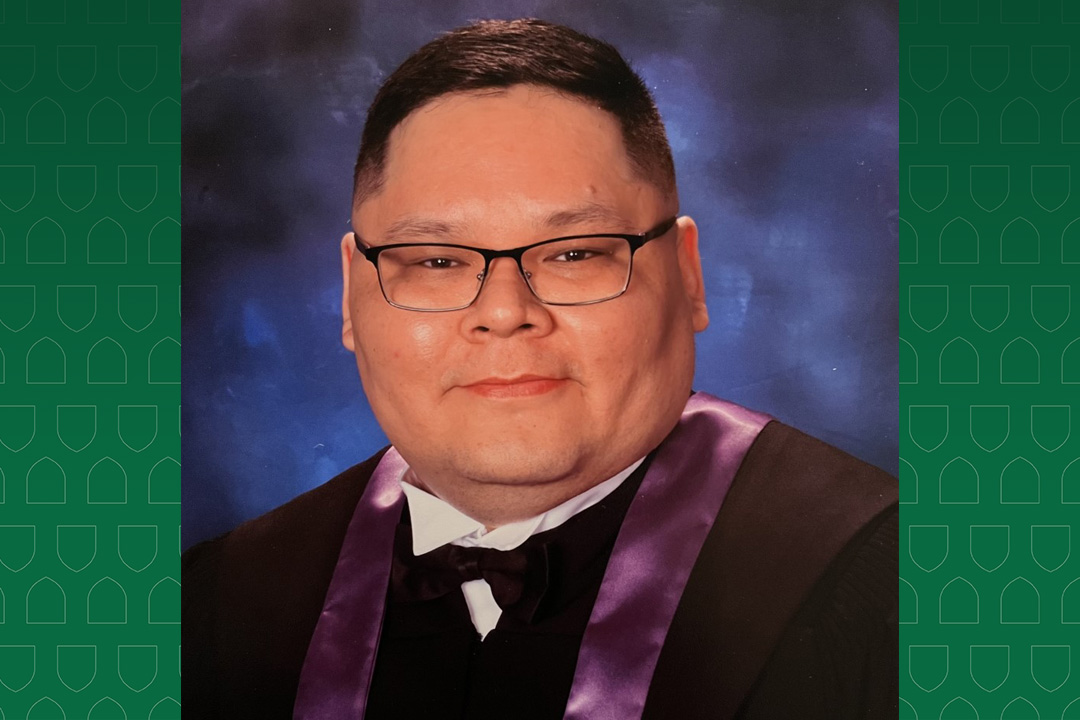
USask student aspires to teach in northern Indigenous communities
Jared Dougal Crane will be recognized for academic excellence during the Indigenous Student Achievement Awards Ceremony on March 9.
By Shannon BoklaschukUniversity of Saskatchewan (USask) student Jared Dougal Crane has advice for people who are pursuing their post-secondary dreams: “Believe in yourself.”
“If I can accomplish my journey, so can you,” said Crane. “It requires hard work, dedication, sacrifice, and believing in ‘kagaskītān’—which means ‘you can do it’ in Cree. Believe that you can help change this world and help others who require help.”
“My journey has had difficult times, and moments where I thought I could not do this,” he added. “What helped me keep going was knowing that many people depend on me to succeed and do well.”
Crane, a Swampy Cree citizen of the Métis Nation–Saskatchewan, is pursuing a Bachelor of Education (BEd) degree through USask’s College of Education. Crane is enrolled in the Cree teacher education program in his home community of Cumberland House, focusing on the four-year BEd elementary/middle years stream, with teaching areas of Indigenous studies and Cree.
“Cumberland House has a long history of producing Indigenous educators who pioneered revitalizing and reclaiming the Cree language. It is a humbling experience to be a part of a group of scholars working towards decolonizing ourselves, our curriculum, and our thinking about education,” Crane said.
“The best part of the experience has been gaining and building on the teachings and knowledge given by Elders, instructors, and family members. I was never alone in my journey and could not have achieved all my accomplishments without their help. My gratitude to all our supporters; I thank all of you: kāginaw kinanāskomitināwāw.”
Indigenous Achievement Week at USask runs from March 6-10, 2023. On March 9, during the Indigenous Student Achievement Awards Ceremony at Gordon Oakes Red Bear Student Centre, students will be honoured for their academic achievement, community engagement, leadership, research, and resiliency. Crane will receive an award for academic excellence, which he describes as “humbling.”
“I take pride in my accomplishments and hope to inspire others to work towards their goals and vision for a better life,” he said. “To me, it is a celebration of people helping people to make the world a better place.”
Cumberland House is situated in the heart of the Saskatchewan River Delta and is home to many First Nations and Métis peoples. In 2021, as part of an Indigenous studies course in the Cree teacher education program, Crane and other USask students in the northern community worked to translate the stories of their relatives and Elders into quilt patches. Crane created a moosehide patch, which was beaded in a medicine wheel pattern by his mother, whom he interviewed.
“We talked about the intergenerational transmission of First Nation and Métis knowledge and the values and concepts behind the medicine wheel. We talked about how her parents taught her values such as respect for others and took her out on the land,” Crane said. “As I grew up, I participated in doing these activities with them, but I was young. We never really talked about it; I experienced it by doing it.”
Crane said the quilt experience helped him develop a deeper understanding of his ancestors. He said he studies in the Cree teacher education program “to honour the memory of my ancestors who have served this country.”
“It is to honour my parents and make them proud. It is to honour my children and their mother,” he said. “Finally, it is to honour children from the many families who entrust teachers to build brighter futures, simply by teaching and caring.”
Crane’s goal is to seek a teaching position in northern Saskatchewan after he completes his BEd degree. He describes it as “an exciting time” to be a student in the Cree teacher education program.
“I want to share a teaching space with the many bright and promising scholars in the educational landscape,” he said. “My goal is to teach in Indigenous communities, for these communities are so welcoming and have much to offer. Through mindfulness and collaboration, teachers can make a difference in reconciliation, revitalization, and renewal.”

